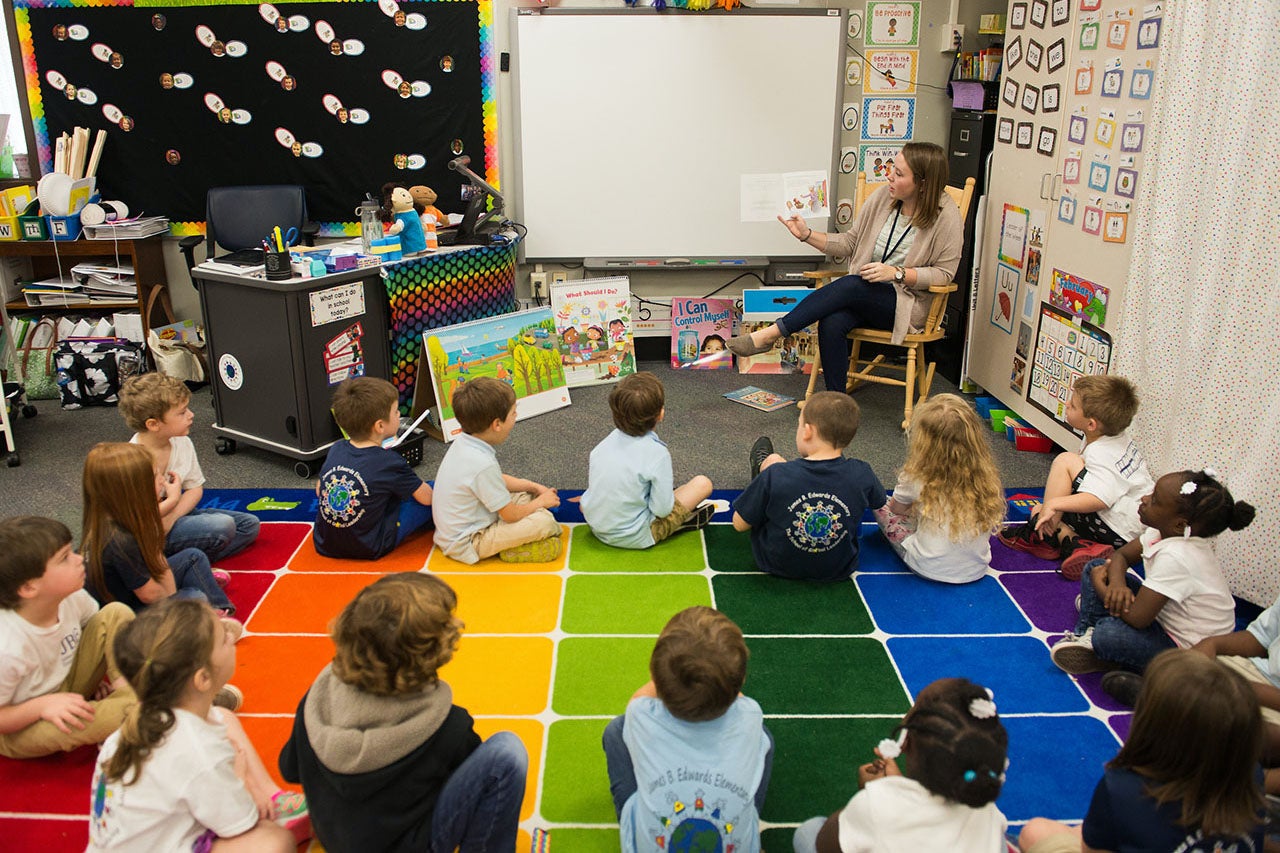With solid enrollment and new programs on the horizon, the College of Charleston’s School of Education is focused on preparing the next generation of teachers to handle any challenges they may face in the classroom.
Despite national dialogue around teacher shortages, pay inequity and teacher burnout, enrollment is up in some of the school’s undergraduate and graduate programs, says Frances Welch, dean of the School of Education. Enrollment in the school’s undergraduate elementary education program, for example, has increased by 25% over the last two years – from 142 students in 2020 to 178 this fall. And enrollment in the Master of Arts in Teaching programs for elementary education and early childhood education has more than doubled over the last few years, with a combined 37 graduate students in those programs today. In total, the school currently has 211 education majors completing practicum hours across 28 public schools in the Lowcountry. Practicum hours allow education majors the opportunity to observe and work with K-12 students in the classroom before full-time student teaching.
“The trends look really good,” says Welch of the school’s enrollment. “This generation wants to make a difference – and what better way to make a difference than be a teacher?”
That upward trend is also reflected in the school’s cohort of 26 teaching fellows for the 2022–23 academic year – the largest freshman cohort the Department of Teacher Education has seen in many years. The Teaching Fellows Program is a statewide program that provides support, professional development and scholarships to college students pursuing a degree leading to teaching certification.
Over the past two years, the school has also welcomed its first students from the Teach Local Program, a partnership between the College, Trident Technical College and the Charleston County School District’s Early College High School. The program allows high school students to take college-level courses, with some students completing associate degrees and enrolling at four-year colleges like CofC to pursue a bachelor’s degree in teaching.
And, since the split from the Department of Health and Human Performance to become a stand-alone school earlier this year, Welch says she and the faculty in the Department of Teacher Education are implementing or developing a series of new undergraduate and graduate programs to give future educators more options to support their career goals.
Tracey Hunter-Doniger, chair of the Department of Teacher Education, says the new minor in education that launched this fall helps open up the field of education to students who are pursuing careers in areas such as business, communications, psychology or nonprofit organizations, and may have an education component to their work. Courses for the minor range from Creating Learning Environments to Neurodiversity: Introduction to the Exceptional Learner to Classroom and Behavior Management, among others.
“It’s about learning how to be a leader, learning how to be innovative and learning how to work with people,” says Hunter-Doniger.
Three new special topics courses coming online for the spring 2023 semester will also give students in any major the opportunity to explore the sphere of education: Influence of Education: Trends and Issues; Education, Community and Non-Profit: Urban Youth and Sports Activities; and Education, Community Non-Profit: Art Influences.
“These courses are geared toward students who are interested in education and nonprofits and will be working with people who work with children in schools,” says Hunter-Doniger, noting that the sports class will partner with the nonprofit Kids on Point and the arts class will partner with the nonprofit Engaging Creative Minds.
With recent approval from the South Carolina Department of Education, the College will also offer a new multicategorical certification for students majoring in special education beginning in the fall of 2023. The change, says Adam Jordan, associate professor and director of the College’s Special Education Program, reflects the shift in recent years to more inclusive classrooms in K-12 schools where teachers may be supporting students with a variety of intellectual or learning disabilities. The change will bring with it a new curriculum and courses for special education majors at the College, including classes that focus on what it means to work with families of students with disabilities and how special education teachers collaborate with specialists such as physical, occupational and speech therapists.
“It opens up more pathways for our students because the jobs that are on the market are multicategorical jobs,” says Jordan, adding that the change allows the College to better support public schools in the Lowcountry. “It helps us better align with what our school partners are doing.”
Other new programs under development include a doctorate in advocacy, learning and inquiry and a Master of Arts in Teaching in multilingual education for college graduates who earned bachelor’s degrees in something outside of education and are interested in teaching students whose first language is not English.
“It’s an exciting time for the School of Education,” says Welch. “We are committed to ensuring the success of our teacher education majors so they can help their future students thrive.”




